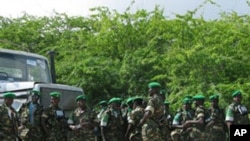The African Union has reportedly named Guinea’s interim president, General Sekouba Konate, to lead the efforts for creation of the African Standby military Force.
Reports quoting A.U. Commission Chairman Jean Ping said General Konate’s title will be “High Representative of the African Union for the Operationalization of the African Standby Force.”
Jennifer Cooke, director of the Africa program at the Washington-based Center for Strategic and International Studies told VOA if the news of General Konate’s appointment is true, it could mean that creation of the standby force could be nearer.
“I think it’s an evolution for the African Standby Forces. These were originally envisioned back in 2003 for each African region to provide a brigade that could be deploy quickly into areas of disaster assistance or into peacekeeping operations. And, I think the various regional command brigades may be evolving to a point where the African Union feels they warrant an overarching leader at this point,” she said.
Cooke said lack of political will on the part of African countries might have partly contributed to the delay in bringing about creation of the African Standby force.
“The contributing countries obviously have many priorities of their own. I think part of it is a question of political will and attention. But, it’s also difficult to coordinate across countries, in certain instances, to do joint training, for example, and communication and so forth. And, that’s really, I think, the challenge that the African standby forces are intended to overcome,” Cooke said.
She said the new development in the establishment of African Standby Force could also mean that African countries are ready to completely assume peacekeeping roles on the continent.
“I think more and more the international community is looking at the African Union to provide troops to places like Somalia, to Sudan and Darfur, to the operation in Burundi, for example. So, I think it’s two-pronged. Yes, the international community is looking to the African Union to do more and I think African states are looking to take on more of those challenges on their own,” Cooke said.
Cooke said the African Union is probably rewarding General Konate for the role he played in guiding a troubled country through a successful election.
“I tend to think he (General Konate) had a fairly good reputation with the African Union. They did help negotiate the immediate crisis backed by the United States. So, he’s in good standing with the African Union and with the United States and I think the broader international community. They see him as having played a fairly neutral and effective role in overcoming Guinea’s electoral crisis,” Cooke said.
She also thinks the African Union might have also been trying to remove General Konate from the Guinea political environment.
“I don’t think they see him as going back to intervene militarily in Guinea in any way, but, maybe, just a nice out (way) for him to distance himself now from the political situation in Guinea,” she said.
Cooke said a unit like the African Standby Force could be sent to Ivory Coast, especially if that country disintegrates further.
“If Cote d’Ivoire disintegrates further, there may actually be a greater role for peacekeepers, and I think the African Union will be called upon to do that. My hope is the African Union civilian leadership, together with ECOWAS (Economic Community of West African States), can prevent disintegration into violence and do away with the need, ultimately, for greater peacekeeping and military intervention,” Cooke said.











